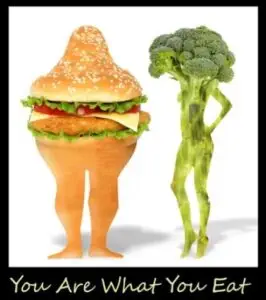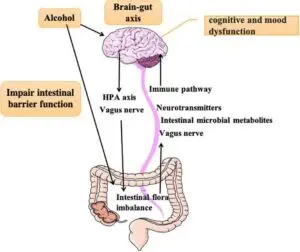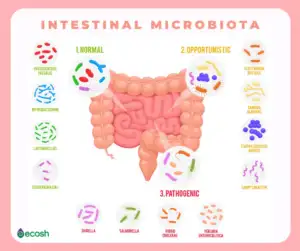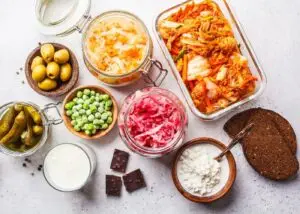Probiotics to Rescue your Guts and Your Brains
With the right gut bacteria you have a better chance of being hopeful & being able to face today’s challenges

Ever heard of the brain gut axis? If not, it’s your lucky day! Simply put, your gut is your ‘second brain’ jam packed with nerve cells that are constantly communicating with your brain. It’s a relatively new topic with a lot research on it and that has found out surprising things like transferring the poop from a healthy person who has a gut full of “good” bacterial into a person with illnesses like c difficile [bacteria that is not treatable by anti-biotics & is a side effect of the over use of anti-biotics] result in eliminating the infection. This is called a fecal transplant and become quite common in the USA. Researchers have found other uses for fecal transplants, such as reducing abdominal stress and tiredness in patients with irritable bowel syndrome (IBS.) Now that I have your attention let’s move onto the kernel of todays discussion: what my wife and do to maintain a healthy gut bacteria through the use of probiotic foods, so we can avoid the need for a fecal transplant!

I make and we eat the following probiotic foods to help maintain a healthy gut flora. All these foods are easy to make and taste delicious. I have also listed some probiotics that I stopped doing because I considered them too much effort.
- Slow Rise Sour dough Bread
The advantages of the extra slow raise is the longer time that the flavours have to develop, which really showed in this loaf. Once you have got the hand of a basic sourdough you can try some variations like adding oatmeal, ground flax, etc.
- Water Kefir is made by adding grains to sugar water, resulting in a fermented, fizzy beverage that is jam-packed with probiotics. It has similar bacteria to milk kefir, which is similar to yogourt, and has been consumed for well over 3,000 years; the term originated in Russia and Turkey and means “feeling good.” It has a slightly acidic and tart flavor and contains anywhere from 10 to 34 strains of probiotics. The milk version is similar to yogurt, but because it is fermented with yeast and more bacteria, the final product is higher in probiotics
- Yogurt
I make is in an Instant Pot which is brain dead simple and then use a fine filter to turn it into Greek yogourt – this extra step removes the whey and makes it much thicker. Why bother with this? My wife loves it more! Possibly the most popular probiotic food is live cultured probiotic yogurt or Greek yogurt made from the milk of cows, goats or sheep. Yogurt, in most cases, can rank at the top of probiotic foods if it comes from grass-fed animals and has not been pasteurized.
- Kimchi – basically Korean Sauerkraut
Kimchi is a cousin to sauerkraut and is the Korean take on cultured veggies. It’s created by mixing a main ingredient, such as Chinese cabbage, with a number of other foods and spices, like red pepper flakes, radishes, carrots, garlic, ginger, onion, sea salt and fish sauce. The mixture is then left aside to ferment for three to 14 days, resulting in a flavor-filled, probiotic-packed ingredient. I do Kimchi just because it has a more interesting taste and is made the same way as Sauerkraut. Sauerkraut is made from fermented cabbage and other probiotic vegetables, sauerkraut is not diverse in probiotics but is high in organic acids (what gives food its sour taste) that support the growth of good bacteria. Sauerkraut is extremely popular in Germany today. It is high in vitamin C and digestive enzymes. It’s also a good source of natural lactic acid bacteria, such as lactobacillus. Both are easy to make using modern sealing container found on the internet and looking like this:
- Miso – we do not make it but use it
Miso is a paste made from fermented soybeans used to flavor Japanese dishes like soups and salads. It has a salty, umami flavor and boasts an impressive nutrient profile. Miso is rich in Vitamin K and other hard-to-get micronutrients like manganese, copper, and zinc. Fermented soy foods like miso have also found to have less negative effects than unfermented soy products.
- Kombucha – we stopped it because the SCOBY needed to be cared for when we left home
It tastes delicious but for me it was too much work. Kombucha is an effervescent fermentation of black tea that is started by using a SCOBY, also known as a symbiotic colony of bacteria and yeast. Kombucha has been around for over 2,000 years, originating around Japan. Many claims have been made about kombucha, but its primary health benefits include digestive support, increased energy and liver detoxification.
- Raw Milk – we stopped it when our kids left [and when it became illegal to own your own part of cow]
Raw cow’s milk, goat’s milk, sheep’s milk and A2 aged cheeses are particularly high in probiotics. Just remember, all pasteurized dairy is devoid of healthy bacteria, so to get the probiotics, you need to stick to only high-quality, raw dairy that hasn’t been pasteurized. Note: Canada is one of the few countries in the world where it is illegal to buy it; when we lived in the USA we legally purchased raw milk all the time. Note#2; dairy farmer are allowed to drink their milk raw and all the ones I know do so and agree that it tastes better and makes them feel better.
- Fermented Veggies – we do not this often enough but when we do they are delicious!
You can easily ferment nearly any vegetable as a way to get more natural probiotics into your diet and preserve food. Nearly everything from carrots, to garlic, to cucumbers (aka, pickles!) are fermentable. The fermentation process populates the vegetables with beneficial probiotics and renders the micronutrients more bioavailable. If you don’t want to make your own pickles, then you can buy pickles. Not all pickles at the grocery store have probiotics, though. Look for brands sold in the refrigerator section that advertise that they include live probiotics. Otherwise, you may need to make your own.

Here a bit of the biology of why probiotics matter as they pertain to a healthy bacteria population in your guts. First, the bacteria are an important part of the process that completes the breakdown of food so that is can be absorbed. Second, There are more bacteria cells is you than your own cells in your body. Third, your guts are the “seat/start” of your immune system. Fourth, many brain dysfunctions [eg. austism] can have a beginning [relationship with] in your guts. Fifth, the 2nd most concentrated number of nerve cells are in your guts.
So what does this have to do with the brain? Hope? Avoiding despair as we confront the reality of our destruction of the natural world? Well, when our guts are healthier our brain is healthier. This topic is HUGE and would require a very long paper to do it justice, but here is one example of what I mean to make the point that eating probiotic food is VITAL as we find ways to keep up our spirits in the face of climate change. Here are experts from 2 recent study.
Therapeutic Interventions of Gut-Brain Axis as Novel Strategies for Treatment of Alcohol Use Disorder Associated Cognitive and Mood Dysfunction
Alcohol use disorders (AUD) is characterized by persistent or intermittent alcohol cravings and compulsive drinking. The functional changes in the central nervous system (CNS) after alcohol consumption are alcohol-associated cognitive impairment and mood disorders, which are major health issues reported in AUDs. Studies have shown that transferring the intestinal microbiota from AUDs patients to germ-free animals causes learning and memory dysfunction, depression and anxiety-like behavior, indicating the vital role of intestinal microbiota in development of neuropsychiatric disorders in AUD. Intestinal flora composition of AUD patients are significantly different from normal people, suggesting that intestinal flora imbalance orchestrate the development of neuropsychiatric disorders in AUD. Studies suggests that gut microbiome links bidirectional signaling network of the enteric nervous system (ENS) to central nervous system (CNS), forming gut-microbe-brain axis (brain-gut axis). In this review, we discussed pathogenesis and possible treatment of AUD-induced cognitive deficits, anxiety, and depression disorders.
Gut microbe linked to depression in large health study
The trillions of bacteria in and on our bodies can bolster our health and contribute to disease, but just which microbes are the key actors has been elusive. Now, a study involving thousands of people in Finland has identified a potential microbial culprit in some cases of depression. The finding, which emerged from a study of how genetics and diet affect the microbiome, “is really solid proof that this association could have major clinical importance,” says Jack Gilbert, a microbial ecologist at the University of California, San Diego, who was not involved with the work. Researchers are finding ever more links between brain conditions and gut microbes. People with autism and mood disorders, for example, have deficits of certain key bacteria in their guts. Whether those microbial deficits actually help cause the disorders is unclear, but the findings have spawned a rush to harness gut microbes and the substances they produce as possible treatments for a variety of brain disorders. Indeed, researchers recently reported in Frontiers in Psychiatry that fecal transplants improved symptoms in two depressed patients.
So, what can you do? Eat more probiotic foods! Avoid antibiotics whenever you can [especially for young children]. Cook your food from scratch and don’t buy processed foods. Skip sugar [ that includes too much carbohydrates like pasta] but eat healthy fats if you can to maintain a healthy weight.
Remember, you are what you eat and since much of you is bacteria you better make sure you have the right ones to keep you healthy, energetic and HOPEFUL so you do not despair as our climate and environment unravel before us.

https://ecosh.com/probiotics-40-health-benefits-of-probiotics-and-20-top-probiotic-foods/https://www.cleaneatingkitchen.com/10-foods-with-natural-probiotics/https://www.frontiersin.org/articles/10.3389/fnins.2022.820106/fullhttps://www.science.org/content/article/gut-microbe-linked-depression-large-health-study
Thank you for this article , it is important to get this information out to all we can. Dr John McDougall would make a great guest to have on sometime. Thank all of you for your work and courage to inform us .
glad you liked the article
i will look up Dr John McDougall and see about interviewing him
thanks for the contact
GORD